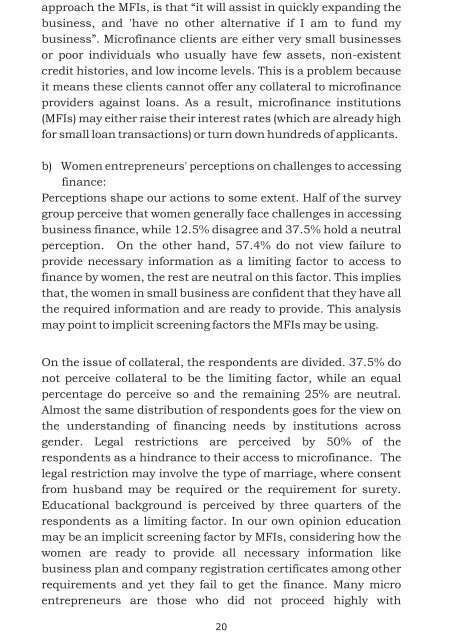Beneficiaries are actors too.pdf - Southern Institute of Peace ...
Beneficiaries are actors too.pdf - Southern Institute of Peace ...
Beneficiaries are actors too.pdf - Southern Institute of Peace ...
Create successful ePaper yourself
Turn your PDF publications into a flip-book with our unique Google optimized e-Paper software.
approach the MFIs, is that “it will assist in quickly expanding the<br />
business, and 'have no other alternative if I am to fund my<br />
business”. Micr<strong>of</strong>inance clients <strong>are</strong> either very small businesses<br />
or poor individuals who usually have few assets, non-existent<br />
credit histories, and low income levels. This is a problem because<br />
it means these clients cannot <strong>of</strong>fer any collateral to micr<strong>of</strong>inance<br />
providers against loans. As a result, micr<strong>of</strong>inance institutions<br />
(MFIs) may either raise their interest rates (which <strong>are</strong> already high<br />
for small loan transactions) or turn down hundreds <strong>of</strong> applicants.<br />
b) Women entrepreneurs' perceptions on challenges to accessing<br />
finance:<br />
Perceptions shape our actions to some extent. Half <strong>of</strong> the survey<br />
group perceive that women generally face challenges in accessing<br />
business finance, while 12.5% disagree and 37.5% hold a neutral<br />
perception. On the other hand, 57.4% do not view failure to<br />
provide necessary information as a limiting factor to access to<br />
finance by women, the rest <strong>are</strong> neutral on this factor. This implies<br />
that, the women in small business <strong>are</strong> confident that they have all<br />
the required information and <strong>are</strong> ready to provide. This analysis<br />
may point to implicit screening f<strong>actors</strong> the MFIs may be using.<br />
On the issue <strong>of</strong> collateral, the respondents <strong>are</strong> divided. 37.5% do<br />
not perceive collateral to be the limiting factor, while an equal<br />
percentage do perceive so and the remaining 25% <strong>are</strong> neutral.<br />
Almost the same distribution <strong>of</strong> respondents goes for the view on<br />
the understanding <strong>of</strong> financing needs by institutions across<br />
gender. Legal restrictions <strong>are</strong> perceived by 50% <strong>of</strong> the<br />
respondents as a hindrance to their access to micr<strong>of</strong>inance. The<br />
legal restriction may involve the type <strong>of</strong> marriage, where consent<br />
from husband may be required or the requirement for surety.<br />
Educational background is perceived by three quarters <strong>of</strong> the<br />
respondents as a limiting factor. In our own opinion education<br />
may be an implicit screening factor by MFIs, considering how the<br />
women <strong>are</strong> ready to provide all necessary information like<br />
business plan and company registration certificates among other<br />
requirements and yet they fail to get the finance. Many micro<br />
entrepreneurs <strong>are</strong> those who did not proceed highly with<br />
20


